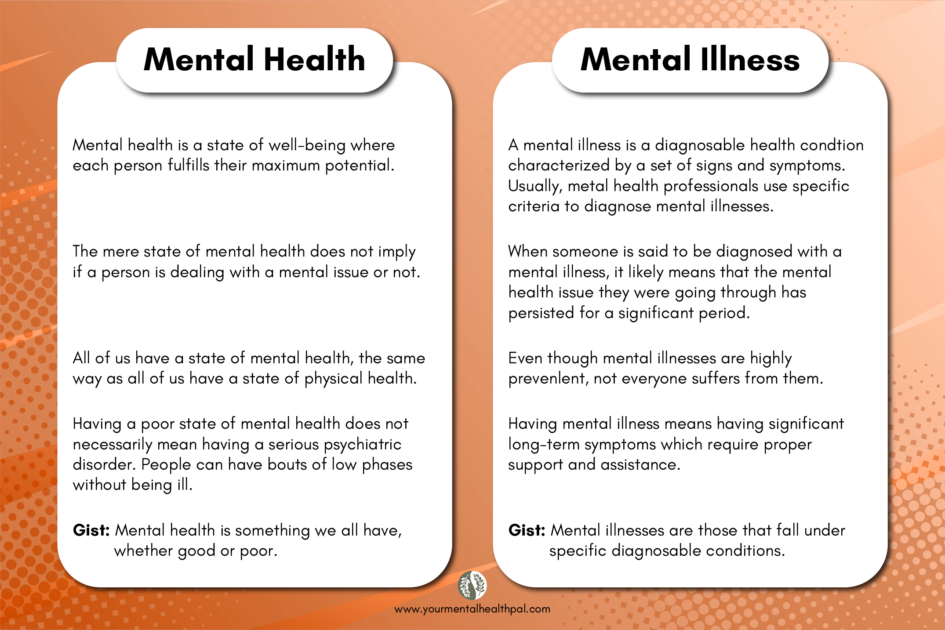
The growth of discussions and awareness around mental health in the past few years is encouraging. However, with this has come a new set of doubts and stereotypes. Intentionally or unintentionally, the meanings of several terms are distorted, and new meanings are attached to them.
We understand language can be a tricky landscape to navigate when it comes to mental health. Although, there might be no sudden impact of the wrong words you use in your daily life. But as we go ahead, it is essential to learn about a few facts.
As the discussion around mental health grows, a few terms have been used interchangeably. ‘Mental health‘ and ‘mental illness‘ are amongst them.
When you talk about mental health, many people immediately start imagining mental illnesses like depression, bipolarity, etc. There is a need for clarity around the differences between mental health and mental illness.
In a metaphorical sense, mental health and mental illness are similar to physical health and physical illness. With this concept in mind, it gets even more important to take time out to understand the difference between the terms. Because the two have been so interchangeably used, warning signs are ignored. A mischaracterization or a lack of understanding can discourage individuals from asking for the required help.
Blurring the lines between health and illness can lead to people dismissing, misjudging, or even stigmatizing those going through a mental illness.
To help you understand the distinctions better, let’s dive deeper into the ‘mental health vs. mental illness’ topic.
First, let us understand the terms as separate entities to gauge their meaning.

What is mental health?
All of us have a state of mental health, the same way as all of us have a state of physical health.
Somedays, you might feel well; other days, you might not. The state of mental health is never static. It continuously changes along with our physical state, environment, and relationships. Protective factors are the ones that positively affect mental health. Negative factors like changes in environment, stress and anxiety might trigger mental health difficulties.
The World Health Organization states that mental health does not only mean the absence of mental illness. It is described as a state of well-being where each person fulfills their maximum potential. It is the state where a person is –
- able to cope with everyday challenges,
- able to work productively and competently,
- able to contribute to their environment, etc.
Mental health is an umbrella term that includes a variety of things. It has a range of mental health issues on one end and mental well-being on the other.
However, the mere state of mental health does not imply if a person is dealing with a mental issue or not.
What is a mental illness?
Just like a physical illness, a mental illness is a diagnosable health condition characterized by a set of signs and symptoms. Usually, mental health professionals use specific criteria to diagnose mental illnesses. Currently, the Diagnostics and Statistics Manual (DSM-V) is used for diagnosing mental illnesses in people.
When someone is said to be diagnosed with a mental illness, it likely means that the mental health issue they were going through has persisted for a significant period. It can also mean that perhaps their symptoms have reached a higher intensity than manageable. In any case, dealing with a mental illness significantly impacts a person’s life and their loved ones. Mental illnesses are an uphill battle people fight every day, and it is important to be empathetic and compassionate toward them.
Mental illnesses are varied and occur in different forms. Anxiety and depression have now become a regular part of mainstream conversations. Still, there are many other conditions people don’t know about. This means that people suffering from these rarer disorders remain stigmatized and alienated in society. That is why there is a need to spread awareness around the full spectrum of mental illnesses and how they can affect a person’s life.
Now that you know what the terms mean, let’s talk about mental health vs. mental illness- how are the terms exactly different compared upfront.
Difference between mental health and mental illness
Mental health and mental illnesses are distinct but related. There are different degrees of mental health. It can range from good mental health to so-so mental health, poor mental health, illness, and finally, disability.
Some people suffer from significant mental health problems that impact their lives heavily. Then there are those who are perfectly fine and healthy. Finally, there’s a group of people who fall somewhere in the middle. They generally have good mental health but suffer occasional setbacks like everyday stress and burnout.
Just like people feel unwell without having a significant illness, similarly, people can have poor mental health without having a mental illness.
However, it is also possible to have good mental health despite having a diagnosed mental illness. That’s mainly because mental illnesses are episodic – there are bouts of ill health and good health.
Here’s the gist – mental health is something we all have, whether good or poor. Mental illnesses, on the other hand, fall under specific diagnosable conditions.
It is important to deduce mental health vs. mental illness clearly. Addressing mental health and mental illnesses is important. If you ignore your poor mental health for long, it might shape into some form of mental illness.
Conclusion
Understanding mental health vs. mental illness is essential to identify whether you are stressed, run-down, or experiencing the possible onset of a mental illness.
If you EVER feel like something inside doesn’t quite feel right or okay, seek proper help and consult a professional. To learn more about treatment options available for you, click here.
To learn more about mental health, subscribe to Your Mental Health Pal.


A very detailed blog which clears the confusion between mental health and mental illness
I have mental it drains me emotionally and physically my depression sometimes all I want is my bed to swallow me.
Thank you for your blog it help me to understand more.
We are glad that our blog is helping you to take care of your mental health. Is there any specific topic you want us to cover? You can share that with us anytime, and we would love to write on that topic.